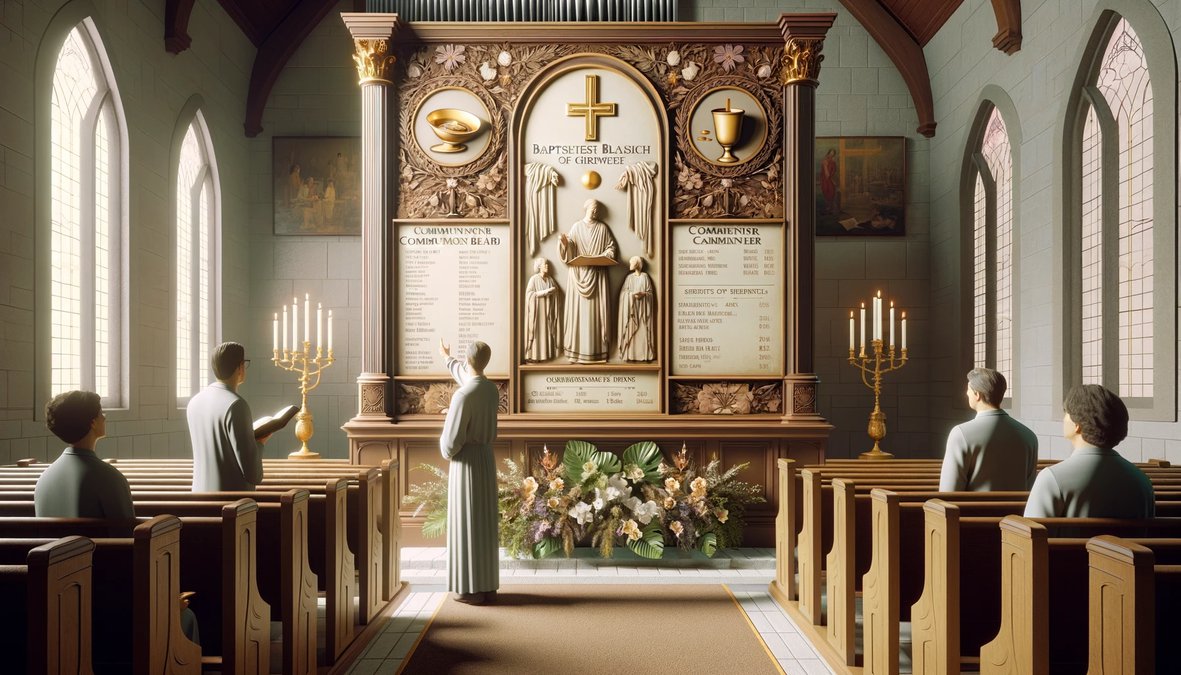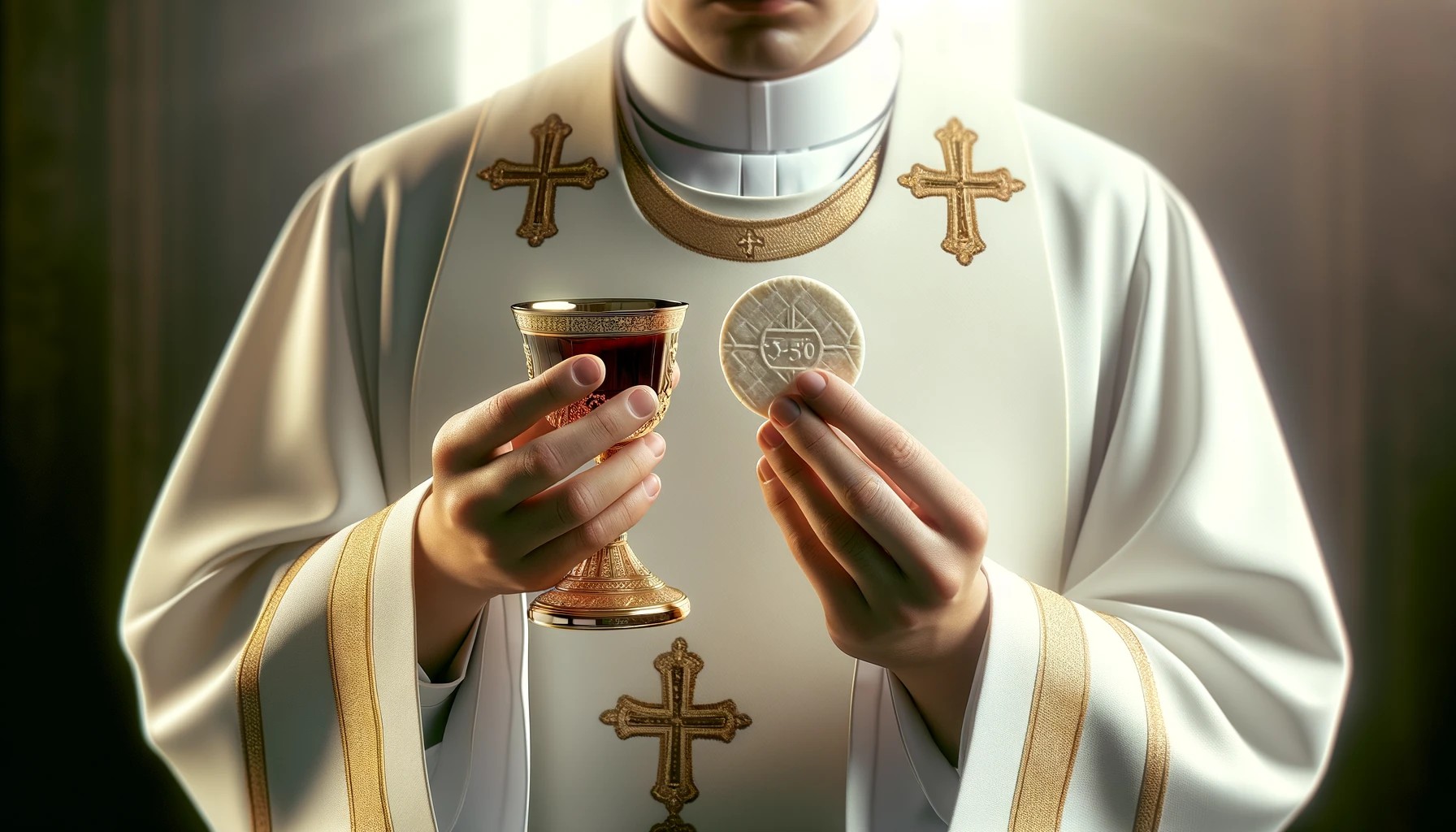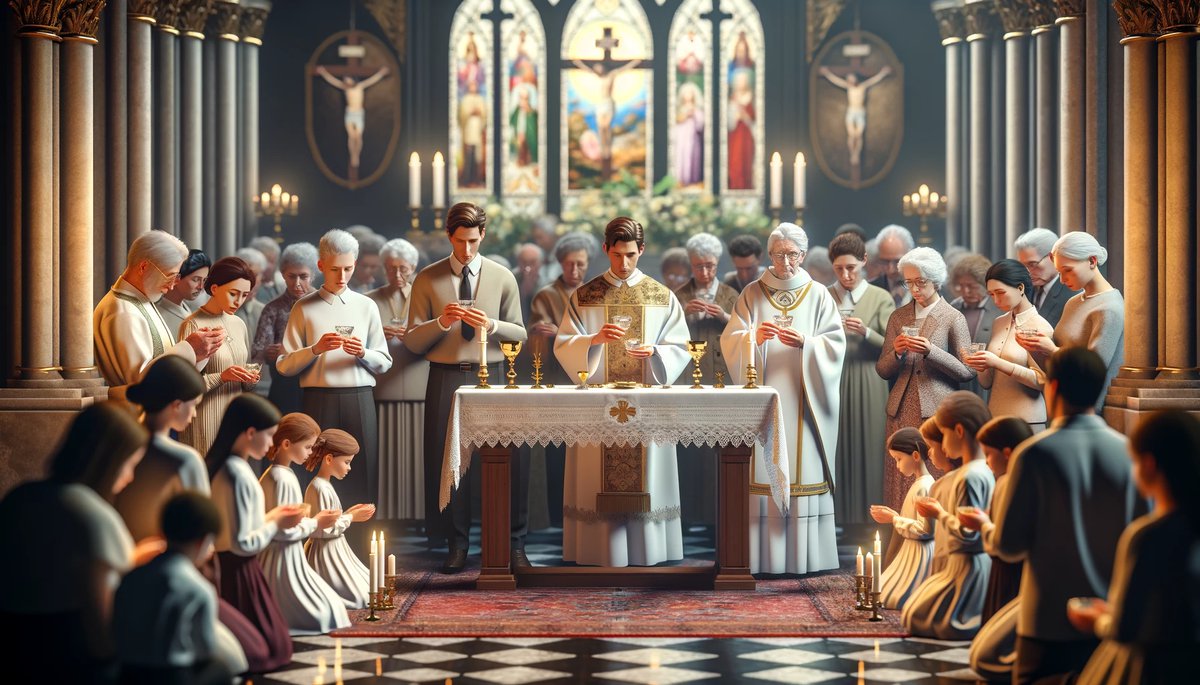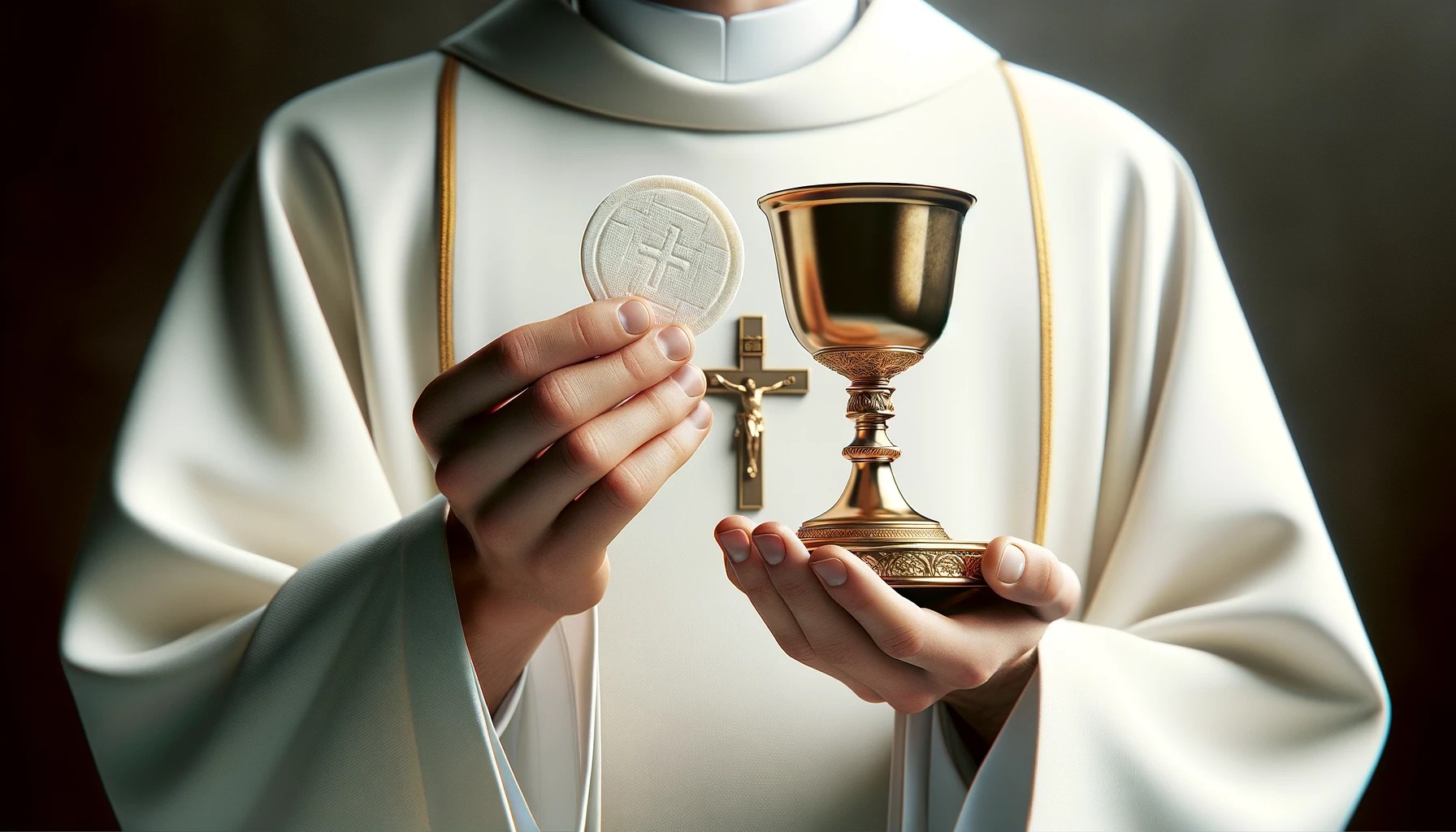Home>Theology and Spirituality>When Do You Do Holy Communion
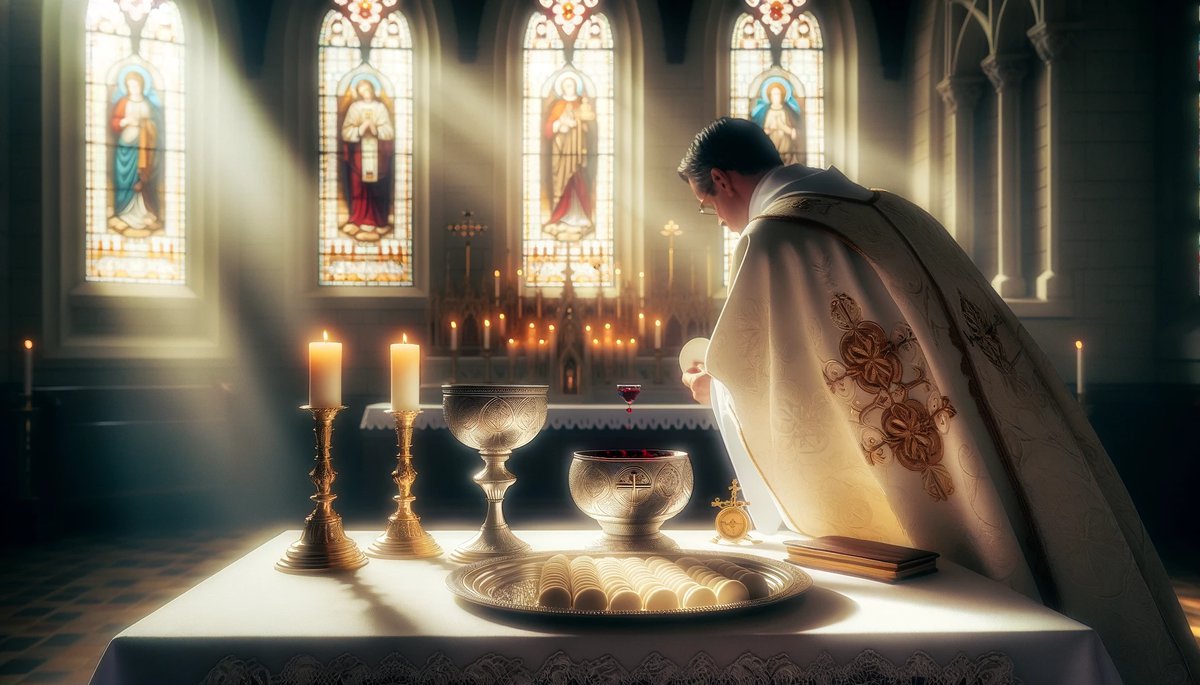

Theology and Spirituality
When Do You Do Holy Communion
Published: February 25, 2024
Peter Smith, Editorial Director at Christian.net, combines deep insights into faith, politics, and culture to lead content creation that resonates widely. Awarded for his contributions to religious discourse, he previously headed a major organization for religious communicators, enhancing dialogue on faith's societal impacts.
Discover the significance of Holy Communion and its role in theology and spirituality. Learn when and how to participate in this sacred practice. Explore the spiritual depth of the Holy Communion experience.
(Many of the links in this article redirect to a specific reviewed product. Your purchase of these products through affiliate links helps to generate commission for Christian.net, at no extra cost. Learn more)
Table of Contents
Introduction
Holy Communion, also known as the Eucharist or the Lord's Supper, holds a central place in the Christian faith. It is a sacred ritual that symbolizes the body and blood of Jesus Christ and serves as a profound expression of believers' unity with Christ and with one another. The practice of Holy Communion has been a cornerstone of Christian worship for centuries, carrying deep spiritual significance and theological importance.
The act of Holy Communion is rooted in the Last Supper, a pivotal event in the life of Jesus Christ. As recorded in the Gospels, Jesus shared a final meal with his disciples before his crucifixion, during which he instituted the practice of partaking in bread and wine as symbols of his body and blood. This symbolic act, imbued with profound spiritual meaning, has been faithfully observed by Christians throughout history as a way to commemorate and participate in the sacrificial death and resurrection of Jesus.
Holy Communion is a multifaceted ritual that encompasses elements of remembrance, fellowship, and spiritual nourishment. It serves as a tangible reminder of Christ's redemptive work on the cross, inviting believers to reflect on the profound love and sacrifice demonstrated through his death and resurrection. Moreover, Holy Communion fosters a sense of unity and community among believers, underscoring the shared bond of faith and the collective identity as the body of Christ.
The significance of Holy Communion extends beyond its historical and symbolic dimensions, permeating the theological fabric of Christianity. It is intricately linked to the concepts of grace, forgiveness, and spiritual sustenance, embodying the transformative power of Christ's presence in the lives of believers. As such, the observance of Holy Communion holds a revered place in the liturgical practices of various Christian denominations, serving as a sacred moment of encounter with the divine.
In the subsequent sections, we will delve into the origins, importance, timing, frequency, and special occasions associated with Holy Communion, exploring the rich tapestry of traditions and beliefs that encompass this sacred sacrament. Through this exploration, we aim to gain a deeper understanding of the profound spiritual and theological significance of Holy Communion within the Christian faith.
Read more: When Should Holy Communion Be Taken
The Origins of Holy Communion
The origins of Holy Communion can be traced back to the Last Supper, a momentous event in the life of Jesus Christ. According to the accounts in the Gospels of Matthew, Mark, and Luke, as well as the writings of the apostle Paul in the New Testament, the Last Supper took place during the Jewish festival of Passover, a time when Jews commemorated their liberation from slavery in Egypt. It was within this historical and cultural context that Jesus gathered with his disciples to share a final meal before his crucifixion.
During the course of the Last Supper, Jesus took bread, blessed it, and broke it, giving it to his disciples, saying, "Take, eat; this is my body." He then took a cup of wine, gave thanks, and offered it to his disciples, declaring, "Drink from it, all of you; for this is my blood of the covenant, which is poured out for many for the forgiveness of sins." These profound actions and words established the foundation of the ritual of Holy Communion, imbuing ordinary elements of bread and wine with extraordinary spiritual significance.
The act of sharing bread and wine as symbols of Christ's body and blood was a poignant and symbolic gesture, foreshadowing the impending sacrifice of Jesus on the cross. It served as a tangible representation of the redemptive work that Christ was about to accomplish through his crucifixion and resurrection. By partaking in the bread and wine, the disciples were invited to participate in a sacred covenant, uniting them with the transformative power of Christ's sacrificial love.
The Last Supper, therefore, stands as the pivotal moment in which Holy Communion was instituted by Jesus Christ. It encapsulates the essence of Christian faith, encapsulating themes of sacrifice, redemption, and spiritual nourishment. The profound significance of this event reverberates throughout the centuries, shaping the spiritual practices and theological understanding of countless believers across diverse Christian traditions.
In essence, the origins of Holy Communion are deeply rooted in the historical and theological tapestry of Christianity, embodying the enduring legacy of Christ's redemptive love and the invitation for believers to partake in the sacred mystery of communion with God and one another.
The Importance of Holy Communion in Christianity
Holy Communion holds profound significance within the fabric of Christianity, encompassing multifaceted layers of spiritual, theological, and communal importance. At its core, Holy Communion serves as a poignant symbol of Christ's sacrificial love and the redemptive power of his death and resurrection. It stands as a tangible expression of the central tenets of the Christian faith, embodying the themes of grace, forgiveness, and spiritual nourishment.
Central to the importance of Holy Communion is its role as a sacrament of remembrance. Through partaking in the bread and wine, believers engage in a sacred act of commemorating Christ's sacrificial death on the cross and the subsequent triumph of his resurrection. This act of remembrance serves as a powerful testament to the foundational narrative of Christianity, inviting believers to reflect on the profound love and selflessness demonstrated by Jesus through his ultimate sacrifice.
Moreover, Holy Communion holds a transformative significance in the lives of believers. It serves as a means of encountering the living presence of Christ, fostering a deep sense of spiritual communion and intimacy with the divine. The act of partaking in the elements of bread and wine symbolizes a profound union with Christ, signifying the spiritual nourishment and sustenance that believers receive through their faith in him.
In addition to its individual spiritual significance, Holy Communion also embodies communal and ecclesial importance within the Christian tradition. It serves as a unifying force, bringing together believers from diverse backgrounds and traditions to partake in a shared expression of faith and fellowship. The act of coming together to participate in Holy Communion underscores the collective identity of the body of Christ, emphasizing the interconnectedness and mutual responsibility of believers within the broader Christian community.
Furthermore, the theological import of Holy Communion is deeply intertwined with the concepts of grace and forgiveness. As believers partake in the elements, they are reminded of the unmerited grace extended to them through Christ's sacrifice, as well as the transformative power of forgiveness and reconciliation. Holy Communion thus becomes a sacred conduit through which believers experience the profound depths of God's love and mercy, reaffirming their identity as recipients of divine grace.
In essence, the importance of Holy Communion in Christianity transcends mere ritualistic observance; it encapsulates the core tenets of the Christian faith, serving as a tangible expression of Christ's redemptive love, a source of spiritual nourishment, and a unifying bond within the body of believers. Its enduring significance resonates across the rich tapestry of Christian traditions, embodying the timeless truths and transformative power of the Gospel message.
The Timing of Holy Communion in Different Christian Traditions
The timing of Holy Communion varies across different Christian traditions, reflecting diverse theological perspectives, liturgical practices, and historical contexts. While the core elements of partaking in bread and wine as symbols of Christ's body and blood remain consistent, the specific timing and frequency of Holy Communion can differ significantly among various denominations and ecclesiastical traditions.
In some Christian traditions, Holy Communion is celebrated as a central component of the weekly worship service, often taking place on Sundays as a commemoration of the resurrection of Jesus Christ. This practice aligns with the early Christian tradition of gathering on the first day of the week, known as the Lord's Day, to partake in the Eucharistic meal. The act of receiving Holy Communion on a weekly basis underscores the significance of the ritual as a foundational aspect of Christian worship and spiritual nourishment.
Conversely, other Christian traditions observe Holy Communion less frequently, with some conducting the sacrament on a monthly or quarterly basis. This approach reflects a deliberate emphasis on the solemnity and reverence accorded to the Eucharist, often accompanied by periods of preparation and reflection leading up to the celebration of Holy Communion. The less frequent observance of the sacrament underscores the profound significance attributed to the act of partaking in the body and blood of Christ, highlighting the transformative nature of the Eucharistic encounter.
Furthermore, certain Christian traditions incorporate Holy Communion into special liturgical seasons and feast days, aligning the timing of the sacrament with key events in the Christian calendar. For example, the observance of Holy Communion during the seasons of Lent and Easter holds particular significance, as it coincides with the journey of repentance, renewal, and rejoicing in the redemptive work of Christ. Similarly, the celebration of Holy Communion during major feast days such as Christmas and Pentecost serves to underscore the interconnectedness of the Eucharistic ritual with the broader narrative of salvation history.
The timing of Holy Communion in different Christian traditions reflects the rich diversity of worship practices and theological emphases within the global body of Christ. Whether observed weekly, monthly, or in conjunction with special liturgical seasons, the celebration of Holy Communion stands as a unifying thread that binds believers across denominational boundaries, embodying the timeless significance of Christ's sacrificial love and the spiritual sustenance found in the Eucharistic feast.
The Frequency of Holy Communion
The frequency of Holy Communion, or the Eucharist, varies among different Christian denominations and traditions, reflecting diverse theological perspectives and liturgical practices. This variation in frequency encompasses a spectrum ranging from weekly observance to less frequent celebrations, each rooted in distinct theological emphases and historical developments.
In many liturgical traditions, such as the Roman Catholic Church and various Anglican, Lutheran, and Orthodox traditions, Holy Communion is celebrated with a high degree of frequency, often as a central component of the weekly worship service. This practice aligns with the early Christian tradition of gathering on the first day of the week, known as the Lord's Day, to partake in the Eucharistic meal. The act of receiving Holy Communion on a weekly basis underscores the significance of the ritual as a foundational aspect of Christian worship and spiritual nourishment. It serves as a poignant reminder of Christ's sacrificial love and the redemptive power of his resurrection, inviting believers to participate in the sacred mystery of communion with God and one another on a regular basis.
Conversely, some Christian traditions observe Holy Communion with less frequency, often conducting the sacrament on a monthly or quarterly basis. This approach reflects a deliberate emphasis on the solemnity and reverence accorded to the Eucharist, often accompanied by periods of preparation and reflection leading up to the celebration of Holy Communion. The less frequent observance of the sacrament underscores the profound significance attributed to the act of partaking in the body and blood of Christ, highlighting the transformative nature of the Eucharistic encounter. It also serves as a time for believers to engage in introspection, repentance, and spiritual renewal, preparing their hearts to receive the sacred elements of the Eucharist with reverence and gratitude.
The frequency of Holy Communion in different Christian traditions is deeply intertwined with theological considerations, historical developments, and ecclesiastical practices. Regardless of the specific frequency, the celebration of Holy Communion stands as a central and unifying ritual within the Christian faith, embodying the timeless significance of Christ's sacrificial love and the spiritual nourishment found in the Eucharistic feast.
Read more: Why Do We Receive The Holy Communion
Special Occasions for Holy Communion
In addition to its regular observance within the context of weekly worship services, Holy Communion holds a significant presence in various special occasions and liturgical settings within the Christian tradition. These special occasions provide unique opportunities for believers to engage in the sacrament of Holy Communion, enriching their spiritual journey and deepening their connection to the redemptive narrative of the Gospel.
One such special occasion for Holy Communion is the celebration of major feast days and liturgical seasons within the Christian calendar. During significant events such as Christmas, Easter, and Pentecost, the Eucharistic feast takes on added significance, serving as a focal point for commemorating the central themes of these sacred seasons. The observance of Holy Communion during these times allows believers to enter into a deeper contemplation of the profound mysteries of the Incarnation, the Resurrection, and the outpouring of the Holy Spirit, thereby enriching their spiritual experience and fostering a renewed sense of connection to the foundational truths of the Christian faith.
Furthermore, Holy Communion is often integrated into special services and ceremonies marking pivotal moments in the life of the church and its members. Baptisms, confirmations, weddings, and funerals frequently incorporate the sacrament of Holy Communion, underscoring its role as a sacred rite that accompanies and sanctifies significant milestones in the lives of believers. In these contexts, Holy Communion serves as a poignant symbol of spiritual initiation, covenantal commitment, marital unity, and the hope of resurrection, infusing these occasions with profound spiritual depth and significance.
Additionally, some Christian traditions observe specific feast days dedicated to the commemoration of saints, martyrs, or theological themes, during which Holy Communion is celebrated as a means of honoring the legacy and witness of these individuals and the enduring truths they represent. The sacrament of Holy Communion thus becomes a vehicle for connecting believers to the rich tapestry of Christian history and the ongoing communion of saints, fostering a sense of continuity and solidarity with the broader community of faith across time and space.
In essence, the special occasions for Holy Communion serve to enrich the spiritual journey of believers, providing them with opportunities to engage in the sacred ritual within the context of significant events, milestones, and liturgical seasons. Through these special observances, the sacrament of Holy Communion continues to be a vibrant and integral expression of the Christian faith, weaving together the threads of remembrance, fellowship, and spiritual nourishment into the fabric of believers' lives.
Conclusion
In conclusion, Holy Communion stands as a sacred and multifaceted ritual that holds profound spiritual, theological, and communal significance within the Christian faith. Its origins rooted in the Last Supper, Holy Communion serves as a tangible embodiment of Christ's sacrificial love and the redemptive power of his death and resurrection. The act of partaking in the bread and wine symbolizes a deep union with Christ, inviting believers to reflect on the transformative grace and forgiveness extended through his sacrifice.
The importance of Holy Communion transcends mere ritualistic observance, encompassing themes of remembrance, spiritual nourishment, and communal unity. It serves as a poignant symbol of Christ's sacrificial love, inviting believers to encounter the living presence of Christ and fostering a deep sense of spiritual communion and intimacy with the divine. Moreover, Holy Communion embodies communal and ecclesial importance, emphasizing the interconnectedness and mutual responsibility of believers within the broader Christian community.
The timing and frequency of Holy Communion vary across different Christian traditions, reflecting diverse theological perspectives and liturgical practices. Whether observed weekly, monthly, or in conjunction with special liturgical seasons, the celebration of Holy Communion stands as a unifying thread that binds believers across denominational boundaries, embodying the timeless significance of Christ's sacrificial love and the spiritual sustenance found in the Eucharistic feast.
Furthermore, special occasions for Holy Communion provide unique opportunities for believers to engage in the sacrament, enriching their spiritual journey and deepening their connection to the redemptive narrative of the Gospel. Whether celebrated during major feast days, liturgical seasons, or significant life events, Holy Communion serves as a poignant symbol of spiritual initiation, covenantal commitment, and the hope of resurrection, infusing these occasions with profound spiritual depth and significance.
In essence, Holy Communion remains a vibrant and integral expression of the Christian faith, weaving together the threads of remembrance, fellowship, and spiritual nourishment into the fabric of believers' lives. Its enduring significance resonates across the rich tapestry of Christian traditions, embodying the timeless truths and transformative power of the Gospel message.



